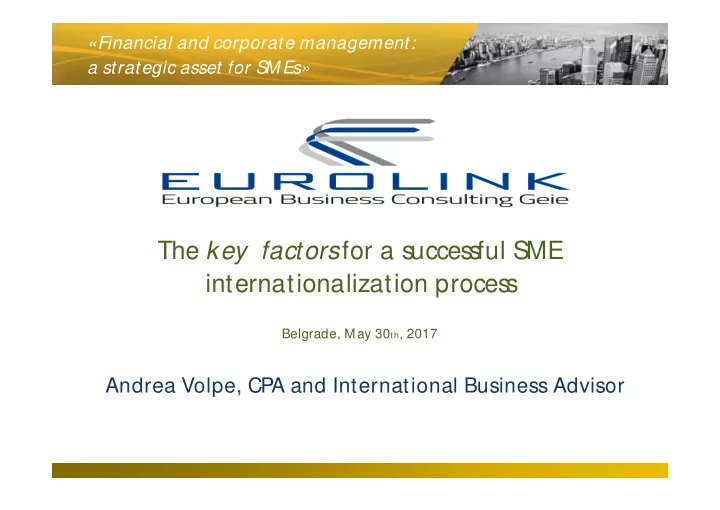

«Financial and corporate management: a strategic asset for SM Es» The key factors for a s ucces s ful S ME internationalization proces s Belgrade, M ay 30 th , 2017 Andrea Volpe, CP A and International Business Advisor
Company presentation The EUROLINK Network is represented by a group of legal, accountancy, company and taxation experts. www.eurolinkgeie.com
Company presentation • Eurolink Network’s mission: to guide Italian and European companies through the internationalization process supporting them step by step. • Small and M edium-sized Companies are our target. • The Eurolink Network puts traders and entrepreneurs in the best condition to do business abroad. • The Eurolink Network assists companies and individuals who have made or intend to make investments in Italy and Europe. www.eurolinkgeie.com
EUROLINK main reference markets In Europe: Italy, Austria, Croatia, Germany, Serbia, Slovenia In Asia: China, Vietnam, India, in Partnership with
Andrea Volpe M ember of CNDCEC SM Es Internationalization Commission Experts supporting European companies abroad
Limits to the international expansion of SM Es STRUCTURE • mainly family-run companies • no external technically skilled managers CAPITAL • lack of capitals • no propensity to get into debt • no necessary capitals to finance internationalization projects ORGANISATION • the structures are good for the local market but lack in human resources focused on internationalization • the owner personally runs the company management • no delegation
Limits to the international expansion of SM Es Consequences : • Traditional lack of SM Es in the internationalization process • Export through distributors instead of direct presence
Limits to the international expansion of SM Es Companies run by managers are more oriented to internationalization • Traditional companies: o working in «mature» sectors show more difficulties in new and successful internationalization actions • Innovative companies: o are focused on internationalization o introduce a limited number of independent products (different from the general context)
Italian (and European) SM Es abroad � SM Es Penetration strategies: based on market segmentation. Aiming at the richest customers (less «price sensitive») � SM Es Structure: characterized by service and technological development to face emerging Countries competition � Companies can be divided into 4 behaviour categories: «Reactive» companies : they already work in emerging markets in response to the aggression 1. experienced in their own country «Hidden» companies : they are subject to the risk of competitive aggression by emerging Countries 2. «Protected» companies : working in protected markets, can be subject to a medium-term risk of 3. aggression in case of change of the market conditions «Lively» companies : characterized by an early aggressive behaviour. Already present in emerging 4. countries. If understanding right time and methods, they are the most easily developing ones.
Internationalization risks In international trade domestic companies can experience risky situations due to different critical issues…
Internationalization risks Difference of markets Contractual risks Credit risks High «business risk» • Possibility of increasing • Difference in language, • Accurate customer management • production costs traditions, habits and best is required by the sales Possibility of wrong • department practices calculation of tributary costs Possibility of extra costs • Difference in civil and • Wrong understanding of Request of advanced payment • • commercial rules, legal and contractual clauses Guaranteed money transfers • political system Difference in currency and Possibility of suspension or Request of • • • monetary regime interruption of the order Irrevocable Letter of credit • Possibility of unsuccessful • Difference in technical rules withdrawal of the goods • Credit insurance • Impossibility or excessive and standards • onerousness of restitution Difference in customs and/ or Exchange risk • • duties system, transportation system, commercial terms Credit risk • Difference in banking system • and ways of payment
Fiscal risks Italian and EU companies wishing to expand their activity abroad need to be careful about fiscal rules related to Income produced Purchases from Countries included in the «BLACK LIST » by foreign subsidiaries
The role of Institutions in SM Es support Chambers of Commerce: � Geographical analysis and Country focus � Participation to Fairs, Visits and delegations abroad � Financings and Contributions Banks: � Information about Country economy � Assistance and support � Financings and banking activities � Verification of risks related to clients’ solvency
Export financings • A company aiming at internationalization needs to develop a tailormade Entry Strategy • The investment structure depends on different factors: short/ medium/ long term objectives, sector of activity, investment size and, in particular, financial sources • Projects to be developed in «distant markets» request important investments, careful evaluation and related financial coverings • Investments are not often covered by the financial system. It is usually chosen to use short term financings. That’s a mistake! The financial balance can be compromised!! • The process of starting-up of a commercial or production activity abroad is not quick. The related financing must be then supported by an appropriate financial plan
Internationalization Check list Experts and entrepreneurs: together in the internationalization process… � Developing market and sector studies � Visiting fairs, researching distributors, evaluating a commercial strategy (Direct Investment? Partner research? Network of companies?) � Studying the financial sources � Preparing the economic and financial Business Plan � Analyzing contractual and fiscal risks (i.e. Transfer pricing) � Choosing the subsidiary’s technicians and managers � Controlling the subsidiary’s activities: audit and management control
Experts: why? Why does a company need the support of an Expert in its internationalization process? � Because the Business Advisor helps the company supporting and assisting his M anagers step by step � Because the Business Advisor can identify the right contacts and can make the company save time and money � Because its experience helps the company to take the right decisions � Because the Business Advisor prevents the company from making mistakes
THANKS FOR YOUR ATTENTION Andrea Volpe – Business Advisor info@eurolinkgeie.com
Recommend
More recommend